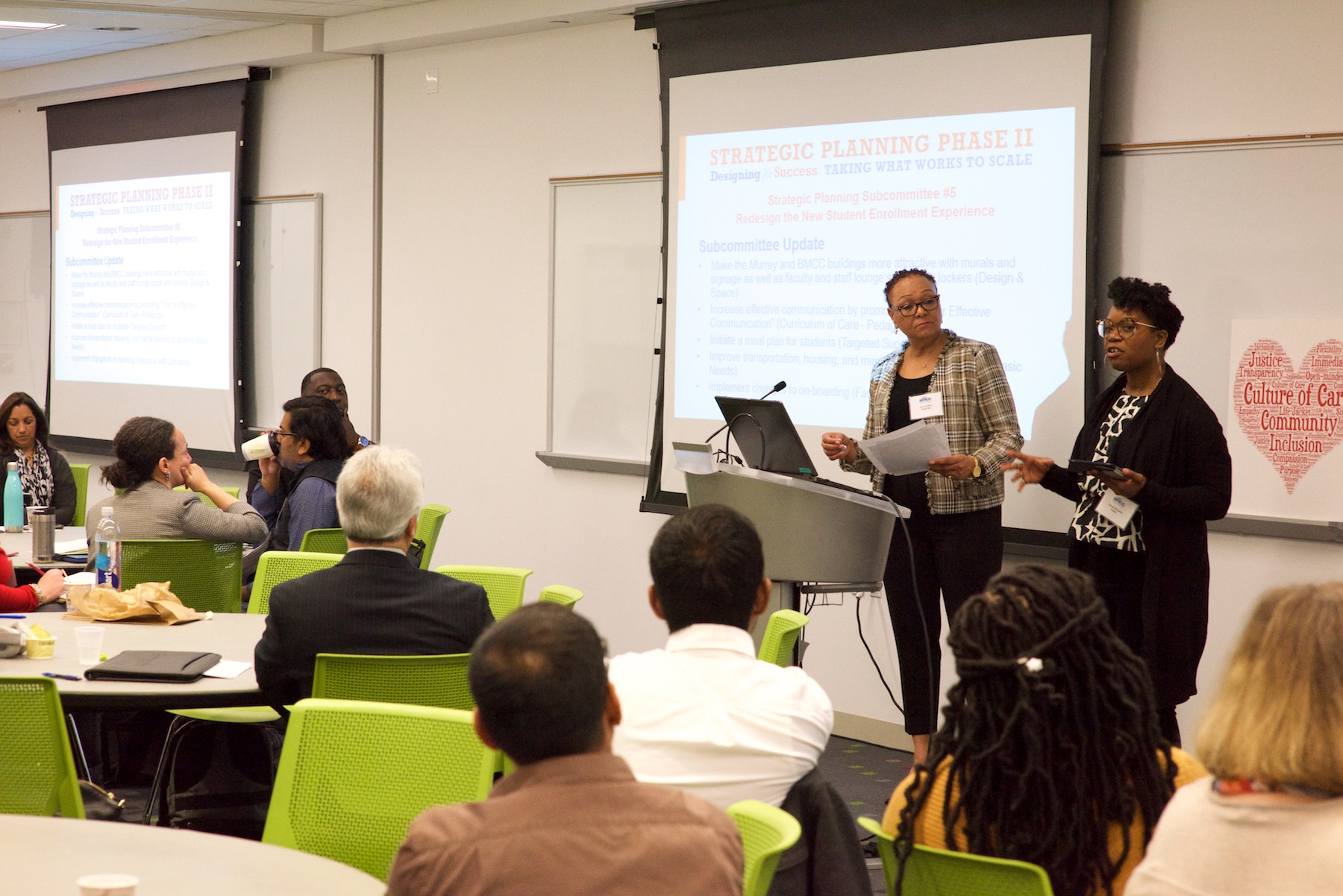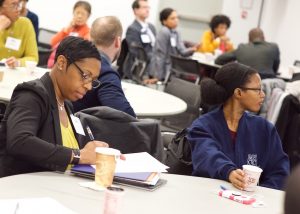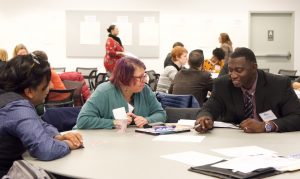
February 18, 2020
In a January 27 message to the Borough of Manhattan Community College (BMCC/CUNY) community, Interim President Karrin E. Wilks reported that after several years of decline, the college’s one-year retention rate has improved to 59.7 percent.
“Our students are also attempting and earning more credits in their first year. We have significantly increased the percentage of freshmen completing college-level math to 44.4 percent,” she said, “and our three-year graduation rate has increased for the sixth year in a row to 24.5 percent.”
Those student gains have happened, in part, alongside BMCC’s rigorous Designing for Success Strategic Plan, now in Phase II, “Taking What Works to Scale.” The strategic plan, informed by focus groups and feedback from all levels of the BMCC community, are led by more than 170 faculty and staff volunteering in six working groups at the college.
On Thursday, February 13, all BMCC faculty and staff were invited to learn about committee updates and propose ways to more pervasively embed what works — the services, programs, instructional strategies, policies and cultural qualities shown to increase student success — into the experience of all students at the college. BMCC community members who want to provide comments or have questions about “Designing for Success” are invited to email: President@bmcc.cuny.edu
In the forum’s opening remarks, BMCC Interim President Karrin E. Wilks referred to the four goals of the strategic plan, which unify the committees’ efforts.
These are: 1) to improve retention and double the college’s degree completion rates, as well as to increase successful transfer and degree completion at the bachelor’s degree level; 2) to improve learning through culturally responsive and sustaining pedagogy and support; 3) to expand career development leading to meaningful work with family-sustaining wages, and 4) to achieve equity in these outcomes in a college community environment in which all members can thrive.
Subcommittee chairs share findings
Determined to create equity and enable every student to thrive, members of the Phase II strategic planning committees are completing a meticulous examination of students’ experience at BMCC — from enrollment to course completion, graduation, and entering a career or baccalaureate program.
That process uncovers points at which BMCC students disengage from their studies and goals, as well as identifying experiences that build and sustain student success.
 Kristin Albright Waters, director of enrollment management, reported on Strategic Planning Subcommittee #1: Redesign the New Student Enrollment Experience.
Kristin Albright Waters, director of enrollment management, reported on Strategic Planning Subcommittee #1: Redesign the New Student Enrollment Experience.
Among other ideas, the subcommittee recommends increasing the wrap-around services that students encounter when they first enter the college.
Joe Ginese, new and first-year programs manager in the Office of Student Affairs, reported on Subcommittee #2: Improve Learning and Engagement in the First Year.
The efforts of that group include taking a close look at the higher success rate of students who take part in BMCC’s First Year Experience (FYE), and they recommend that FYE be embedded within a course at the college or presented as a stand-alone workshop series for all students.
Christopher J. Thunberg, director of the Center for Career Development, and Leslie Rennis, chair of the Health Education Department, gave an update on the efforts of Subcommittee #3: Integrate Career Development Throughout the Student Experience.
Through their examination of students’ career-related engagement at the college, those subcommittee members recommend presenting events themed around each BMCC Academic and Career Community, and increasing federal work study opportunities, especially those that relate to the student’s major.
Gregory Farrell, director of the BMCC Learning Resource Center, and Eda Henao, a professor in the Modern Languages Department, reported on Subcommittee #4: Improve Completion and Transfer Rates Through Integrated Support Services.
Based on what its members have discovered, this group contends that students would benefit if supplemental instruction were embedded in their math and co-requisite courses. They also suggest establishing a platform to make transfer information accessible for faculty, students and staff.
 Deborah Harte, director of BMCC Single Stop, and Syreeta McFadden, a professor in the English Department, gave an update on the investigative efforts of Subcommittee #5: Strengthen our Culture of Care for Students, Faculty and Staff.
Deborah Harte, director of BMCC Single Stop, and Syreeta McFadden, a professor in the English Department, gave an update on the investigative efforts of Subcommittee #5: Strengthen our Culture of Care for Students, Faculty and Staff.
Their proposed steps include making campus spaces more inviting with murals and signage, creating a meal plan for students, and enhancing the college’s current onboarding practices for new hires.
Michelle Ronda, a criminal justice professor and coordinator for that program, along with Jennifer Longley, a teacher education professor, reported on the work of Subcommittee #6: Strengthen BMCC’s Role in a Thriving NYC and as a Leading Community College Nationally.
This group recommends that BMCC identify its community partnership and service relationships, and find ways to leverage those connections to benefit more students. They also suggest reconstituting the BMCC sustainability committee, and developing a 10-year sustainability plan.
Participants give feedback on the BMCC mission, vision and values statements
After the committee presentations, forum participants reviewed an existing version of the BMCC mission statement and two updated drafts, voting on which they think best represents the college. A complimentary box lunch followed, then the tables convened for a discussion of the BMCC vision statement.
These activities were led by Associate Director of Assessment Erika R. Carlson on the 14thfloor of the Fiterman Conference Center, and Dean of Institutional Effectiveness and Strategic Planning Christopher Shults, on the 13thfloor.
Shults emphasized that while a mission statement describes college priorities, a vision statement represents the college’s future achievements. He also facilitated a spirited discussion on BMCC’s core values: “agreed-upon principles, beliefs and ideals that guide the faculty, staff and administrators of the college.”
Core values, he explained, represent expectations to which the college community holds itself accountable, and reflect an emotional connection to the mission.
In a closing activity, the forum participants were given a sheet with 14 values, such as “community,” “care,” “inclusion,” “collaboration,” “equity” and “affordability” — and gauged which seven they felt warranted the highest priority at BMCC.
The results of these activities will be considered in the revision of BMCC’s mission statement and other materials.
Next steps, including student forums
The Designing for Success, Phase II, Taking What Works to Scale subcommittees will continue their close looks at student engagement at BMCC, for the rest of the academic year.
By May of this year, the committees will present their complete findings and recommendations, and by September, the 2020-2025 Strategic Plan will be published and made available to the BMCC community.
Among other next steps, student forums will be held March 31, April 1 and April 2, and their input will be used to further focus the process of determining what programs, policies and learning experiences best connect with students’ strengths.
Indicators of student success — enrollment and course completion, retention and graduation rates — will continue to be analyzed as the strategic planning process continues.
STORY HIGHLIGHTS
- On February 13, the BMCC community was invited to attend committee presentations for Phase II of the BMCC Designing for Success Strategic Plan: Taking What Works to Scale, in the Fiterman Hall Conference Center
- The forum was led by Interim President Karrin Wilks; Dean of Institutional Effectiveness and Strategic Planning Christopher Shults, and Associate Director of Assessment Erika R. Carlson
- BMCC community members who want to provide comments or have questions about Designing for Success are invited to email: President@bmcc.cuny.edu

